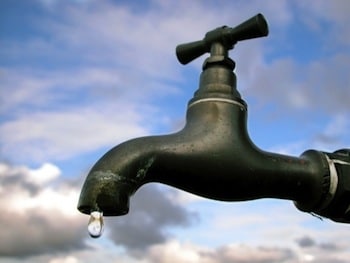As many areas of the country experience severe droughts, the fight for clean, fresh water is becoming vital to survival for many American citizens. The problem has been made worse by the expansion of hydraulic fracturing (fracking), which gobbles up hundreds of millions (billions, according to some estimates) of gallons of potable water every month.
The state of Texas has become the prime example of what can happen when the natural gas industry is allowed to run roughshod over citizens. The state is currently experiencing one of the worst droughts in modern times, and certain areas have already had to resort to water rationing.
But the dwindling supply of fresh water in Texas has barely slowed down the natural gas industry’s fracking activities. Even as livestock are dying off, crops are withering, and citizens are having to purchase bottled water in order to quench their thirst, fracking companies are sucking fresh water out of the ground in order to satisfy their need to extract every ounce of natural gas from beneath the Texas soil.
The drought and water shortages in Texas have gotten so bad that some residents have said that on some days, they can turn on their faucets and nothing even comes out anymore.
But some residents aren’t bothered by the lack of water, or by the gas industry’s activities that are compounding the problem. In fact, they’ve figured out how to make a fortune off the disaster.
According to AmericaBlog, some Texas residents have begun to lease their property to the gas industry simply to dig wells and pump water. One man reported that he is leasing his land for a staggering $36,000 a month to the gas industry. This man is either the world’s greatest salesman, or the gas industry knows that they have created a problem that is only going to become worse in the very near future.
There is also the push-back from the dirty energy industry’s astroturf organizations. The industry front group Energy in Depth dismisses the claims that fracking uses too much water by making silly comparisons to the paltry amount of water used on golf courses, car washes, and even the water that flows from the Mississippi River into the Gulf of Mexico (which Energy in Depth apparently thinks is wasteful). However, they seem to overlook the fact that none of these activities (which all use less water than fracking) are pumping toxic chemical cocktails into the ground, further contaminating remaining water supplies as fracking does.
The reason the gas industry is allowed to use up all of Texas’ fresh water while residents goes thirsty is simple. They are one of the largest campaign donors and lobbying groups in the state, and few Texas politicians are willing to deny those hefty paychecks, or to stand up to the abuse that they are inflicting upon the state.
Texas is not alone, either. The state of Colorado is also willing to let the gas industry have access to water while denying that privilege to residents. Thanks to the effects of climate change, the Colorado River basin is drying up very quickly, starving aquifers that feed large portions of the Midwest. There is now a battle taking place in Colorado on who gets what’s left of the water – farmers, residents, or the gas industry.
The fracking / water shortage story is almost too ironic to believe. Americans are overly dependent on fossil fuels, which leads to climate change, which leads to droughts and water shortages, and the remaining water is then used up in our quest for more and more fossil fuels. It’s a self-sustaining cycle that can only be broken by embracing clean, renewable forms of energy. But in places like Texas, the state that oil built, the idea that renewables can win the day is laughable.
While independent media outlets have done a great job of telling this story, there is a separate, but related, component that has yet to be fully developed, and that is the problem of water privatization.
As the general concept of privatization continues to impact education, prisons, and national security, the impact that it is having on our water supply has been grossly overlooked.
All over the country, private companies are trying to take over the water delivery systems, which would be a disaster for American citizens. A prime example is the city of Atlanta, Georgia. Many years ago, they experimented with privatizing their water supply, and the results were less than flattering. Residents soon began to complain about dirty, brown water being delivered through their pipes, and some areas actually stopped being served altogether. The enormous public backlash prompted the city to cut the 20-year contract they had signed off after only a few years.
The same story unfolded in Detroit when they moved to privatize their water supply, and it was replayed again in states like Massachusetts, Ohio, and Detroit. Rate hikes, poor water quality, and the reduction in covered areas are all common when private companies take over the supply and delivery of water.
So that leaves us with a three-fold attack on the American water supply: There is the growing threat of water shortages from climate change, a problem that could be irreversible; The over-consumption of water from the natural gas industry; And the threat that private corporations pose when they try to take over our water.
Sadly, little is being done to mitigate this three-pronged assault on water. How many more livestock and crops will we sacrifice to the gas industry as they can continue to frack us right out of drinkable water?
Subscribe to our newsletter
Stay up to date with DeSmog news and alerts






